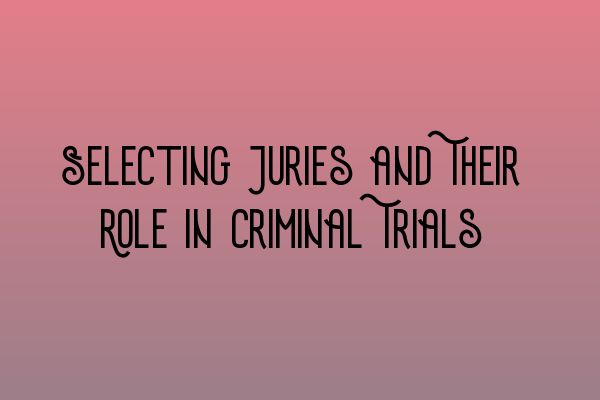Selecting Juries and Their Role in Criminal Trials
Introduction
In the criminal justice system, the role of the jury cannot be overstated. Juries are an integral part of the trial process, and their selection is a critical and meticulous task. The composition of the jury can significantly impact the outcome of a criminal trial. This blog post aims to shed light on the process of selecting juries and explores their vital role in criminal trials.
Understanding the Jury Selection Process
1. Jury Summoning
The first step in the jury selection process is known as “jury summoning.” When a criminal trial is scheduled, a pool of potential jurors is randomly selected from the community. These potential jurors receive a summons, compelling them to report for jury duty.
2. Questioning Potential Jurors
The next phase in the jury selection process involves questioning potential jurors. This is known as “voir dire,” derived from French meaning “to speak the truth.” During voir dire, the judge, defense counsel, and prosecution have the opportunity to ask potential jurors questions to determine their suitability to serve on the jury.
3. Eliminating Biased Jurors
One crucial aspect of jury selection is to weed out potential jurors who may have biases that could interfere with a fair and impartial trial. Both the defense and prosecution have the right to challenge potential jurors through a process known as “peremptory challenges” or “challenge for cause.” This ensures that jurors with prejudiced views or personal connections to the case are eliminated from the pool.
The Role of Juries in Criminal Trials
1. Fact Finders
Juries are responsible for impartially determining the facts of a case. They carefully analyze the evidence presented by the prosecution and the defense, weigh witness testimonies, and assess the credibility of the evidence. Ultimately, it is the jury’s duty to determine guilt or innocence based on the facts presented.
2. Legal Interpreters
Juries are not legal experts, but they play a crucial role in interpreting the law. The judge instructs the jury on the relevant legal principles and guidelines they must apply in reaching their verdict. Juries must understand and apply these instructions to the facts of the case.
3. Ensuring Public Confidence
Juries also serve a vital function in maintaining public confidence in the criminal justice system. When a diverse group of individuals with different backgrounds and experiences participates in the decision-making process, it helps foster trust within society. The participation of citizens in the trial process demonstrates that justice is not solely in the hands of legal professionals but also involves ordinary citizens.
Conclusion
The selection of juries plays a pivotal role in the criminal trial process, ensuring fair and just outcomes. To maintain a fair trial, juries must be selected through a meticulous process that identifies biases and prejudices. By acting as fact finders, legal interpreters, and upholders of public confidence, juries contribute to a more equitable criminal justice system.
If you require legal assistance regarding criminal law matters or help with jury selection, SQE Criminal Law & Practice Law UK is here to help. Our team of expert solicitors is well-versed in jury selection, ensuring that you receive the best representation in your criminal trial. Contact us today for personalized legal advice and support.
